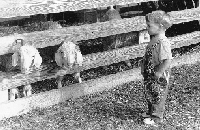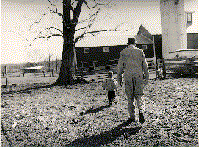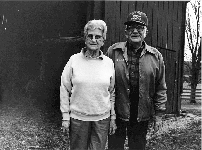
While the roles of children and
grandparents on the family farm haven't changed much over the
last few generations (providing for an enduring continuity of life experience) the roles
of men and women as parents and laborers have greatly changed.

Children
According to Joan Cassell of Mount Vernon, one distinguishing characteristic of
growing up on a farm is that "the children have work to do and it has to be done. It's not like in town where you try to
think up chores for the children to do to give them a sense of responsibility. You don't have to
think up anything out here." She also adds, "But, its not like they were forced to work, because
when the children where young they spent most of their time playing and fishing and hiking.
That was great, too." Growing up on a farm means that there are daily chores that children must
do. Like all children, farm children often have to be convinced to get their work done. "When my children say,
'Do we have to do our chores again?' I say, 'Do you want to eat again? I just made dinner last night.'
The kids know that the animals are part of our family, too. It is a rule on our farm---the animals
get fed before we do," says Becky Shinaberry of Fredericktown. Even though the work may be tiresome and repetative, children are often able to
blur the distinctions between work and play on the farm.
Voices: the farm as family...
The Blanchard brothers, of a Howard pork farm, recall how working together on the farm as children gave them the important qualities of patience, cooperation and responsibility that allow them to continue to work as farm partners. "We started with simple little jobs like getting firewood," explains Don, the oldest brother, "as far as actually feeding the hogs, you have to be a lot older and have a little responsibility to know when the sows are sick and what they need. When you're little, you're not quite ready for that." The brothers remember spending time with their mother in the garden as children developing an interest in the way things grow. By the time they were in high school they spent weekends and hours after school learning and developing the skills they use today as adult farmers. The second brother, John, also cites religion as being a major influence on the brothers' ability to cooperate and manage the family farm. To make a partnership work on a family farm he says, "you just can't be a greedy person always jealous of what the other has."
The major trend away from diversified farms (having chickens and a cow in addition to having livestock and crops, for example) has somewhat affected children's chores. Jobs like milking and tending to chickens which can be done by pre-adolescent children are rare on today's specialized farms. Nevertheless, there are many opportunities for children to learn about farming: 4-H, FFA, Vo-Ag Programs and of course, from their parents. Even if the children choose not to be farmers, the life lessons they learned on the farm will still be valuable.
Voices: why the farm is a valuable learning opportunity for children...


Senior Citizens
In Knox County, some senior citizens either continue to farm their land or rent it out, while others either
sell or give the land to their children to farm. Alva and Mary Hall, for example, are retired
and run their farm with the help of their son-in-law. Typically, if an elderly farm couple has
children in the area, they will relinquish most of the duties of the farm to them as they get older.
The Blanchard Family, who own a multigenerational hog farm in Howard, have three sons who have
expanded the farm and taken over their retired father's farming duties. Some farmers choose to
rent their land out and/or work what they can. If the grandparents live in close proximity to their
grandchildren as is the case with the Halls, the Blanchards, the Shinaberrys and the Cassells, for
example, they are able to share both their common connection to the family land and their
experiences as farmers and citizens.
Diane and Terry Randall, Fredericktown dairy farmers, are an example of the new style of
partnership on the family farm. They both milk, plant crops, disk and bail hay. Diane says, "I'm
out there. I'm on the tractor more, I'm actually doing more things on the farm than my mom did.
Back then, the women were more in the home. Mom was always there. I do both, but I don't
have the big elaborate meals that my mother had prepared for us." Traci and Allen Cassell, who
live on an Angus beef farm in Mount Vernon both have jobs off the farm and share farming and
parenting duties. They are preparing for the time when Allen's parents, Joan and Art, retire from
farming. Then, they will take over more farming responsibilities.
On the Shinaberry farm in Danville, Dennis is a full-time farmer while Becky works off the farm.
Becky's income sustains the family while farm profits are channelled right back into the farm.
Some women in Knox County feel that since the introduction of more farm
machinery, women have been encouraged to leave and work for supplementary income, health
insurance and other benefits for the family. This has lead some farm women to echo the claims
made by suburban and urban women that the responsibilities of the contemporary woman are
overburdened by a heavy workload both inside and outside the home. The changes that are
occurring in society-at-large have affected the farm, too.
Within the organization of the Blanchard farm, there are many types of labor divisions. The three
brothers, John, Donald and Edward divide their labor to run the farm while John and Donald's
wives each work as nurses off of the farm. Edward's wife, Monica, works in the home as the primary
caregiver for the children. She also is involved in the community and keeps a garden where Ed
is the "helper." Renate and Keith Miller live on a dairy farm in Dublin, Ohio. Renate feeds the
cows, disks, chops and bails hay, manages the household and maintains the farm's bookkeeping.
Her husband does the majority of the farm work. This style, with the wife as "helper" and
manager of the household affairs is also how Amish families organize their labor.
There is no "right" way to run a family farm. Each family decides their own division of labor
and familial relations according to their beliefs, tastes, religious upbringing, talents and financial
situation.
photo credits: Rachel Balkcom

Men and Women
The traditional gender roles of men and women have been changing in society-at-large and on the family farm.
Knox County shows that the family farm of the 90's is not necessarily headed
by a male proprietor and assisted by his wife and children. Men and women choose their roles more so than in
in the past. But, no matter how the family organizes their labor, everyone must work as a team in order to run a
successful farm.
Kathy Hall, of Mount Vernon, owns a fruit and Christmas tree farm. Although she did not grow
up on a farm, she is the primary manager of the farm while her husband, Bill, works for Ohio
State University and helps out some on the farm. She sees the traditional woman's role on the farm changing.
"More and more husbands are going out and getting full time jobs, " she says and, "more and
more women are having to get more involved with the actual farm work because you can't hire
labor and it's so expensive to farm." Although she enjoys her work, Kathy thinks women farmers
face certain challenges. "You're fighting that sort of old-fashioned dependence and roles, I think
its harder because it hits at the home. There's these women growing up as teenage girls, you
know they're hearing from their big brothers that women shouldn't do that, or women can't do
this, and it hurts more hearing that from somebody you love so much. Women who choose to
stay in farming, its coming from people they're deeply emotionally attached to, versus having a
career where they're strangers and you can tell them to be quiet!"


 E-Mail The Family Farm Project
E-Mail The Family Farm Project